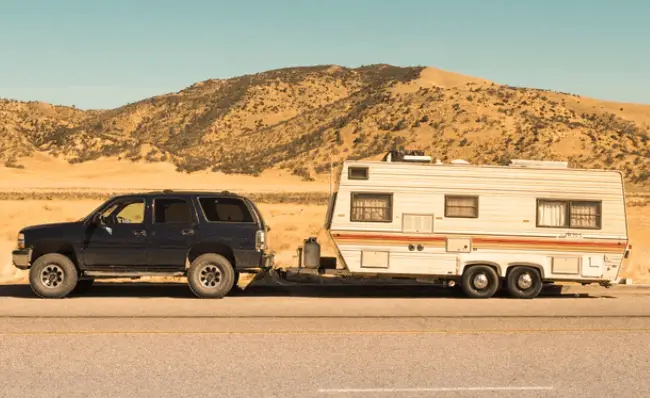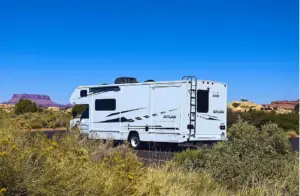Every camper has a Gross Vehicle Weight Rating that should never be exceeded. Therefore, having an understanding of your camper weight is critical.
It is not just the gross vehicle weight that you should know but also the dry weight and the hitch weight.
You should know the weight before you finally purchase the camper to make sure the tow rating matches that of your tow vehicle. It can be frustrating to buy a camper, only to realize later that it is too heavy for your vehicle.
What is Dry Weight of a Camper?
When it comes to understanding the weight of your camper, the first thing you should know is the dry weight.
Dry weight of a camper is weight without any cargo, supplies, fuel, passengers or water. This however, includes optional and standard equipment’s like generator but without any fuel. It is also known as the shipped weight which means weight of the RV when shipped by the manufacturer.
The dry weight of a camper varies based on various factors. It depends on the manufacturing process, features, and size.
Campers with high dry weight usually have more amenities and space, but those with less dry weight have limited space and few amenities.
Dry weight of most popular campers range from 2,000 to 9,000 lbs. and the average dry weight of campers is about 5,200 lbs.
Having said this, larger motorhomes and fifth wheel can weigh much more. Similarly, you also get pop up campers, small travel trailers and teardrop trailers that weigh way less than average.
Towed campers weigh much less and will require a vehicle with the recommended towing capacity for towing. But, for mobile campers that are self-driven have a much higher dry weight since they do not depend on a towing vehicle.
Most camper manufacturers usually indicate the dry weight of the recreational vehicle. Others come with brochures that state the dry weight of your camper.
If the camper is new, you can easily know the dry weight. However, this is not the case with second-hand campers since most of them have additions that may increase the dry weight.
How to Find the Dry Weight of my Camper
For safe towing and handling of your camper, it is essential to know how to calculate the dry weight of your camper.
The weight not only affects the tires and the hitch but also your own safety when traveling with the camper.
Here are different ways that you can use to find out the dry weight of your camper.
1. Weigh at local weight station
To find the dry weight of your camper, take it to the local weigh station. You can easily find these stations online or at the truck stops.
Make sure you unload everything, including the batteries and tanks. Then weigh the trailer.
Detach the trailer from your tow vehicle and get the weight of your vehicle. Then get the difference between the two, which is the dry weight of your camper.
2. Ask the Manufacturer
While most manufacturers will not indicate the dry weight of the camper, they can provide you with this information when you request them.
Other manufacturers will have online systems that calculate the dry weight of your camper for you. All you need is to provide certain details, and you get the results.
If the online weighing option is not available on the manufacturer’s website, you can call or email them to get the dry weight.
For them to give you the accurate dry weight of your camper, ensure you provide the correct details on the manufacturer year, model, specifications, and options list for your camper.
3. Use the Information Sticker on your Camper
Another way to find out the dry weight of your camper is through the sticker that is usually provided by the manufacturer for new campers.
For most campers, the sticker is located either on the exterior or interior part of the door.
Some manufacturers will also provide a labeled sheet that includes the manufacturer’s paperwork.
The sticker usually indicates the dry weight or the actual weight of the camper with factory installed options.
The weight information provided on the sticker is more accurate than weighing the camper.
However, if the camper does not have this information, you can use other ways.
How to Weigh My Camper
There are several options when it comes to weighing a camper. Below are the different approaches that you can weigh your camper.
1. Using CAT Scales
The first option to weigh your camper is by using CAT scales. You can easily get CAT scale at a gas stations.
The good thing about CAT scales is that they produce accurate results. But first, you will need an appointment so that you can be assigned a weighing master. This can be done using their mobile app.
When making an appointment, you will need to provide details such as the type of camper you have and manufacture details.
Once you get to your nearest gas station, the weighing master will direct you to place your camper at the right spot for weighing.
This process takes a short time, and you will even get a document that shows the weight of your camper if you need it.
2. Weight Your Camper at RVSEF
Another option to weigh your camper is at RVSEF. It involves weighing your camper by wheel position, which is the most recommended way.
This is because it does not only provide the weight of your camper but gives you the accurate weight on each wheel.
With this information, you will know if you need to redistribute the weight and whether the tires need any inflation.
Additionally, understanding the amount of weight on each wheel will help you know how much pressure is needed on the tires. Weighing your camper by position offers RVers essential information on maintaining their campers.
The best thing about weighing at RVSEF is that it provides you with the exact weight of each wheel. This helps you to keep and maintain safety with the camper.
Additionally, you get a detailed report that includes all the weight parameters of your camper. The RVSEF is known for affordable and modern weighing techniques; hence, it is recommended by most RV manufacturers.
However, with the RV safety education foundation, you will need to schedule an appointment.
They tour different locations; hence you will have to wait till they are near your location. From their website, you will be able to see the future schedules for your booking.
3. Truck Stops
Weighing your camper at the truck stops is the easiest option to know the weight of your RV.
Whenever you are traveling with your camper, make sure you stop at the truck stop and make use of the weighing scales.
Most of the truck stops provide certified weighing scales that include CAT scales.
The good thing about weighing at the truck stops is that you do not need to make appointments.
You can weigh your camper anytime you find a truck stop. Weighing with CAT scales can give you a lot of insights about your RV, such as the gross vehicle weight rating or the overall weight of your camper.
But, weighing at truck stop CAT scales will cost you around $10 to $15 if you want to weigh your camper for the first time.
For reweighing, it will cost you less to about $3. Considering the safety advantages that come with knowing the weight of your camper, the cost is not much.
At the truck stops, you will not be able to get the weight by wheel position, which gives the individual wheel and corner weights.
However, you will find multiple scales that will measure the steer axle weight, trailer axle weight, drive axle weight, and the overall weight.
4. Local Weighing Points
There are various local weighing points that you can get the weight of your camper. Most of these points are privately owned, and therefore, you will need to request first and book an appointment.
You can use the local weighing points if you have not found reliable weighing stops, such as the mentioned above. Searching “RV weighing near me” on search engine will quickly give you various options.
One thing a lot of RVers want to know is:
When moving on highways if you see a weighing station, should you stop with your RV? The answer is no! You don’t have to stop at a weighing station, those are meant only for freight hauling.
Dry Weight vs. Gross Weight
When it comes to purchasing a camper, you need to understand the difference between gross weight and dry weight.
The gross weight is the actual weight of a camper that is fully loaded with all the gear. It refers to the current combined weight of a camper with passengers, fuel, tanks, and water. On the other hand, dry weight refers to the weight of a camper without any loads.
The Gross vehicle weight rating also referred to as GVWR, is the maximum loaded weight of your camper. It includes the weight of the camper itself, the passengers, and the load. The gross vehicle rating is determined by the manufacturer.
The gross vehicle weight rating is very crucial for safety. It states the maximum weight that your camper can handle when you have loaded everything.
Exceeding the gross vehicle weight rating can lead to damages and risks such as overheating the engine, overworking the brakes, wearing out tires, and damaging the tow vehicle. The GVWR is indicated on each camper or the manufacturer’s manual.
By using the GVWR and the dry weight, you will be able to know how much load you should put on the trailer.
Other Important Weight Ratings to Know
If you own a camper or planning to buy one soon, you should know these ratings to help with the safety and maintain your camper and the tow vehicle.
Keeping your RV under specified weight limit rating is utmost critical. In case of travel trailer or fifth wheel even slight difference can cause serious issues like swaying or turning over of the trailer.
Weight distribution is also critical. Make sure you distribute all the cargo, equipment, accessories equally on all the tires and do not overload any one tire. This will put pressure on tires and may result in early tire failures.
Gross Vehicle Weight Rating (GVWR)
Gross Vehicle Weight Rating is the weight limit set by the manufacturer which should never be exceeded. This rating is not an actual weight but a limit set for safety purposes. Never load your travel trailer beyond this weight.
GVWR of an RV is not same as the dry weight. GVWR is the limit set by manufacturer for safety, dry weight on the other hand is weight of the camper without any additional equipment, cargo or fluid.
Gross vehicle weight (GVW)
Gross vehicle weight is the actual weight of the travel trailer when it is fully loaded with water, food, optional equipment and everything you need for camping. At all given times this weight should always be less than the GVWR. Gross vehicle weight is also referred to as GTW (Gross Trailer Weight). GTW makes it more clear on what we are referring to.
Gross Combined Weight Rating (GCWR)
Gross Combined Weight Rating refers to the maximum weight of your tow vehicle and the camper together. It also includes supplies and cargo loaded in either of the vehicles.
Gross Axle Weight Rating (GAWR)
Gross Axle Weight Rating refers to the maximum weight that you should place on the rear axles of a camper. The gross axle weight rating is provided by the manufacturer.
Tongue Weight
Tongue weight is the actual weight on the hitch ball of the travel trailer. For safety, this weight should always be between 10 to 15%. Tongue weight is included in the GVW of the travel trailer. For fifth wheels, this weight is referred to as king pin weight and it should be between 15-25% for safety.
Curb Weight :
Curb weight is weight of the travel trailer with all optional equipment’s, water tanks, propane tanks and all the equipment fluids but it does not take into account cargo and passengers. This weight is important to determine how much cargo you can add. Lets see the cargo weight definition below.
Cargo Weight or Cargo Carrying Capacity:
Cargo weight is the additional weight of the items or cargo you can add to your travel trailer. This includes all cargo items like clothes, food, tongue weight, additional equipment’s and accessories. Knowing this number is important as you can plan on how much cargo you can add to your RV. You can use various other rating from the list to determine the cargo weight.
How much weight can you add to your camper?
The next important and most practical thing a new RVers would want to know is “how much weight can i add to my RV“?
Lets answer this.
Cargo carrying capacity of the RV is the actual amount of weight one can add to the RV. CCC is basically the difference between GVWR and the UVW.
Once you have the difference, substract the additionally added accessories like dish antenna, solar panels, etc. Then, you also need to substract the sleeping capacity (170 lbs multiplied by number of sleeping positions). This final number of pounds is the amount of additional weight you can add to your camper.





